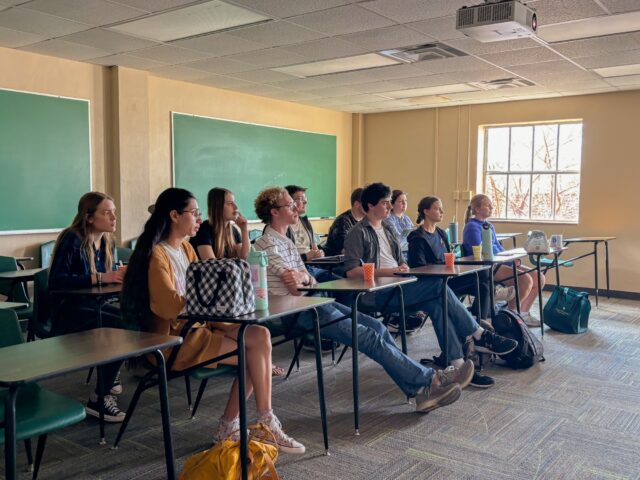By Caitlyn Beebe | Reporter
Greco-Roman classics may be ancient, but they find their place in modernity through Eta Sigma Phi — an honor society that hosts specialty lectures, classics-inspired activities and community events.
Austin senior and chapter president Elijah Roberts said Eta Sigma Phi draws students from diverse fields of study who see classics as a passion rather than solely as a potential career.
“That’s what really comes out in the Eta Sigma Phi culture,” Roberts said. “There’s a love for learning the classics, and there’s a love for applying the classics in all these different fields of study.”
Roberts said many fields of study have their origins in classics, and students in any discipline can benefit from the language skills and critical thinking that come with studying classics.
“As a science major, I’ve benefited tremendously from knowing where our science really comes from and from knowing where the history of science really comes from,” Roberts said.
Mechanicsville, Va., senior and chapter vice president Hannah Payne said Eta Sigma Phi focuses on promoting classical scholarship and community.
“The study of classics is really formative to people as students and educators but also as participants in society,” Payne said.
Eta Sigma Phi hosts a variety of events, reflecting the wide-ranging applications of classical studies.
“We want to be intentional about making sure we expose students to different areas of the ancient world, from philology and epistemology to material culture to modern research, archaeological excavation and more,” Payne said.
In January, Eta Sigma Phi supported a theater production of “Menaechmi” — a play written by the ancient Roman dramatist, Plautus. Payne said the play was performed in its original language by students who had translated the work as part of a class.
Roberts said helping with last year’s production of “The Cyclops” was one of his favorite experiences with Eta Sigma Phi.
“Whenever you start with a [play’s] text, you know absolutely nothing about it,” Roberts said. “Then to go take it and speak it and perform it, that’s something huge.”
On March 1, Eta Sigma Phi helped host Latin Day — an event that showcased Baylor’s classics department to high school students. According to the classics department website, Latin Day includes quiz bowl-style competitions and Latin speaking contests.
Payne said other Eta Sigma Phi events include Roman banquets, a “Take a Dative” Valentine’s Day event and “Percy Jackson” watch parties. Eta Sigma Phi members also have the opportunity to present their research and apply for scholarships.
To join Eta Sigma Phi, students must receive a B or higher in at least one Greek or Latin class and must be nominated by a professor.
“It’s not a barrier to entry,” Roberts said. “It’s not making classics a whole minor or major or concentration. Anyone can get into it.”



